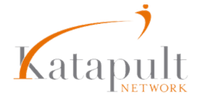Best Questions to Ask at the End of an Interview
September 13th, 2023
At Katapult Network, we understand that people are more than just a resume and jobs are more than just a list of tasks. We're a recruiting company that takes a human-focused approach to the job search where we're able to match college graduates with entry-level, professional jobs. Whether you're a job-seeker looking to start your professional career or a hiring manger seeking to build your future leadership at the entry-level, we're excited to be your partner in navigating the search process.
Throughout one's career journey, almost everyone experiences the interview process. One of the most effective ways to make a lasting impression is to pose insightful questions at the end of the interview. Here are five questions you should consider asking:
1. "What do you find the most challenging about working at this organization?":
This question is important because it helps you to understand what sort of obstacles you might face if you join the organization. Also, this question may open the door to other honest discussions about how you can contribute positively to overcoming these challenges and become a valuable member of the team.
2. "How do you help your staff grow professionally?":
Asking this question is crucial to understand the organization's commitment to employee development. It shows that the company is interested and invested in helping you grow within the ranks. The answer also provides insights into the company's culture, values, and whether they have a structured approach to employee training, mentorship, or opportunities for advancement.
3. "How do you evaluate success in this role?":
This question is important for both you and the interviewer because it tells you what the job is all about and how they'll measure how well you're doing. It's like having a clear set of rules or guidelines that show you what you need to do in the job. Knowing this helps you do well in your role and lets you see how you can grow in your career with the company.

4. "Do you have any hesitations about my qualifications or experience?":
This question also promotes open communication between you and the interviewer. It offers a chance for you to discuss any concerns or areas where you might have gaps in your qualifications. By doing so, you can showcase your self-awareness and your willingness to learn and grow. Additionally, it gives the interviewer the opportunity to share any reservations they may have, which ultimately helps both sides make an informed decision about whether the role is the right fit for you.
5. "How do you think the company defines and demonstrates its values?":
Understanding the company's values is important for you as it helps you gauge if you fit in with the company's culture. Asking this question shows your interest in aligning with the company's core principles and ethics. Moreover, the response also reveals if the organization actively puts its values into practice through its actions, policies, and initiatives. This demonstrates the company's dedication to creating a positive workplace environment and being socially responsible.
In conclusion, interviews are a common part of career journeys, and asking insightful questions at the end can leave a lasting impression. These five questions not only provide valuable information but also demonstrate your interest in the organization, its culture, and your commitment to making an informed career decision.




